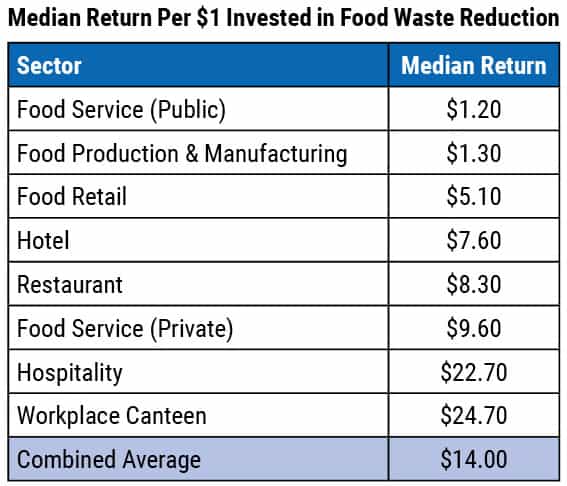Food Waste Reduction Program Leads To Financial Gains
Food waste reduction could increase your bottom line. Manufacturers, retailers, and restaurants received a median return on investment of 1,300 percent when implementing food waste reduction programs, according to a report from Champions 12.3.
The report, The Business Case For Reducing Food Loss And Waste, reviews historical data from nearly 1,200 business sites, from more than 700 companies, across 17 countries to determine the financial impact of food waste reduction efforts on businesses. The results of the study are overwhelmingly positive with more than 99 percent of sites reporting a net positive financial return on food waste reduction efforts.
The study found that for every $1 invested in food loss and waste reduction the median company site realized a $14 return (or a 1,300 percent return on investment). Returns vary widely across the company sites studied within eight different sectors, with the highest median return reported at $24.7 for every $1 invested in the workplace canteen sector.
Cost and Benefits
Food waste reduction programs are investments in the operation. Thus, certain costs are incurred when initiating or modifying a food waste program. These include staff training, consultant fees, equipment purchase or rental, and process or product redesigns. More than 99 percent of company sites featured in the report saw positive gains from costs associated with food waste reduction programs.
Reported financial benefits included optimizing food or raw material purchases, lowering waste collection and management costs, reducing disposal fees and adding revenue from higher value food sales. Companies in various stages of implementing food waste reduction processes saw financial gains, including those with no current processes and those with systems in place. According to the report, company sites with the highest returns either had no recent food waste reduction efforts, required only simple changes in employee food management practices, or already had the necessary equipment such as scales, containers and refrigeration units.
Managing a Food Waste Program
The business case outlined in the report recommends a three-step approach to food waste management programs.
- Set a Target
Set a specific food waste reduction goal with a target date. For example, the United Nations Sustainable Development Goal set a target to reduce food waste by 50 percent by 2030. Not only will this make it easier to track your progress, setting and communicating a specific goal can increase your motivation to reach it.
- Measure Food Waste
Track and measure the food wasted in your operation. This provides quantifiable data that can help you better understand how much, where and why food is wasted.
- Act Based on Data
Review your food waste data to identify opportunities and implement procedures to reduce waste. A data visualization tool, like the one Quest provides to clients, recycling can help you make timely and efficient decisions related to your needs and goals.

At Quest, we can help you reduce food waste across your organization through nationwide programs for organics and meat and seafood recycling. We design custom, turnkey solutions based on your operational needs to meet your food waste reduction, and other sustainability, goals. More than just managing your food waste, Quest tracks your food waste data and uploads it to Q link, our online portal with a data visualization tool to help you identify actionable insights for your operation.
To learn more about Quest’s food waste programs, download our Retail Food Waste in the U.S. White Paper or contact Quest today.
About Champions 12.3
Champions 12.3 is a coalition dedicated to inspiring ambition, mobilizing action, and accelerating progress toward achieving United Nations Sustainable Development Goal 12, Target 3 (12.3), to cut global food waste per capita in half by 2030.











